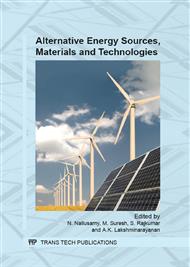p.426
p.431
p.437
p.442
p.448
p.454
p.460
p.465
p.470
Experimental Study on the Machinability of Inconel 718 Alloy Using Coated Carbide Tool
Abstract:
While machining a material, it is essential to understand the characteristics of work material for choosing the favorable condition of the material, appropriate cutting tool, machining parameters to achieve desired optimum output. Accordingly, researchers always devise their studies to improve the machining processes resulting in enhanced product quality and increased production rate simultaneously. Such machining studies on super-alloys attract significance, since they are oriented towards overcoming the difficulties involved in machined out a component. Generation of heat in the cutting zone and high cutting forces on the tool being experienced while machining super-alloys, are due to poor thermal conductivity and work hardening characteristics. Above factors contribute to two basic problems viz. the inability of the tool materials to give long tool life and the metallurgical damage to the machined components due to induced stresses. Among the super-alloys, Inconel 718 is the widely used heat resistant super alloy (HRSA), which withstands stringent operating conditions in high and cryo temperature environments for longer duration. Studies on understanding the behavior and the relationship between work piece material, cutting tool materials, cutting conditions and the process parameters is an essential requirement for establishing and optimizing the machining process and the present work is tailored towards this objective. In this work, Inconel 718 alloy was subjected to turning experiments and the experimental data collected was used for constructing empirical models whose performance was assessed through statistical approach. It is established that the models developed could be used for predicting the output parameters for a set of input of parameters through 2-D (surface) and 3-D (contour) plots.
Info:
Periodical:
Pages:
448-453
DOI:
Citation:
Online since:
August 2015
Authors:
Keywords:
Price:
Сopyright:
© 2015 Trans Tech Publications Ltd. All Rights Reserved
Share:
Citation:


